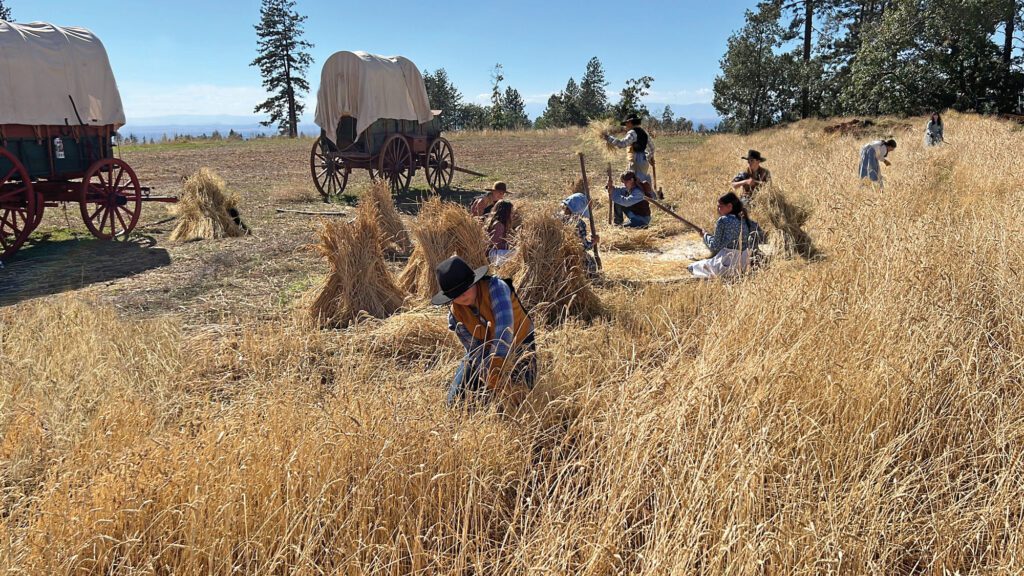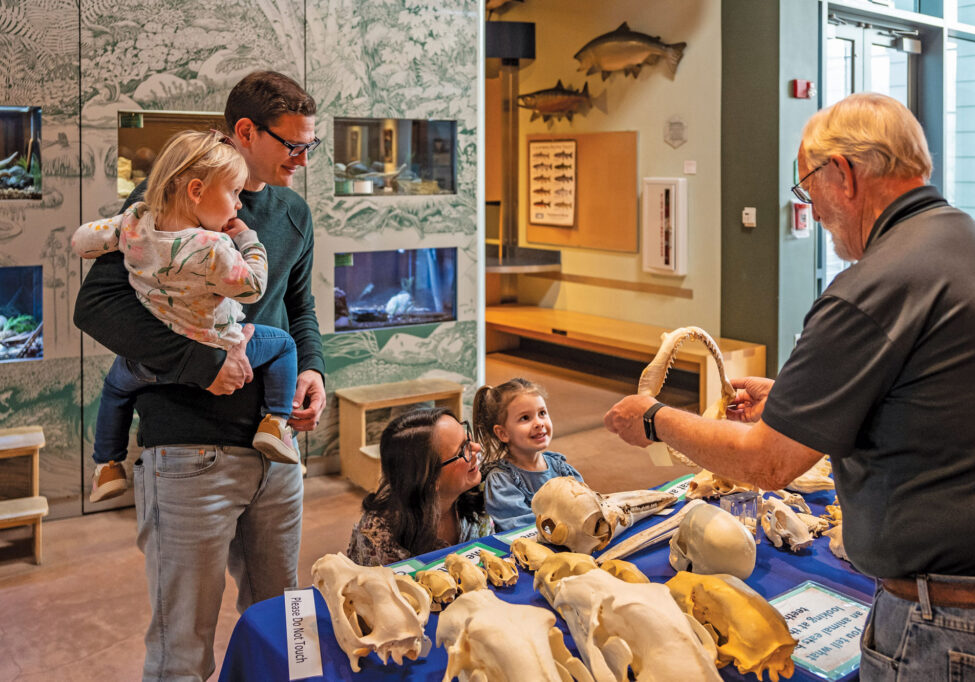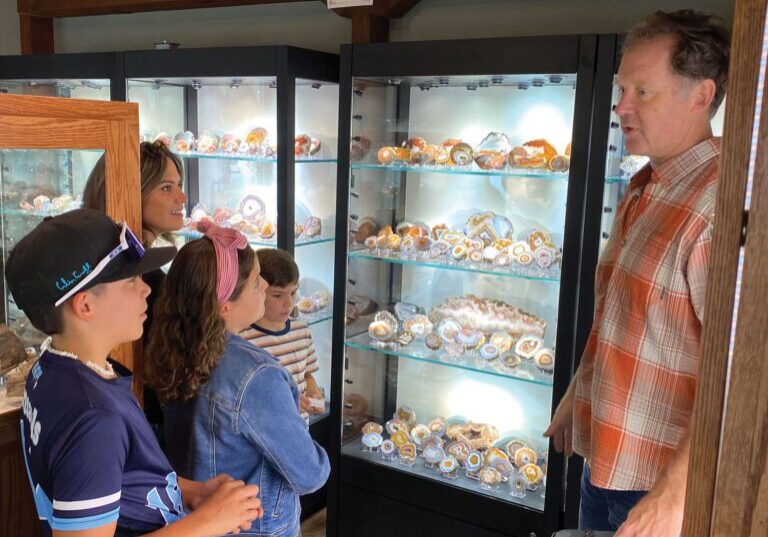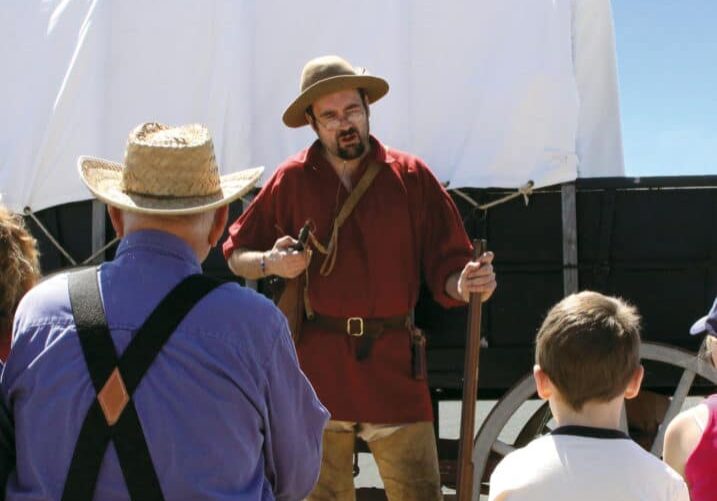For almost 30 years, David Vixie has brought history to life for seventh and eighth grade students. David is the principal of the Paradise Adventist Elementary School, a place he describes as being “book smart and experience rich.” For a week every year, students, parents and volunteers don mid-19th century outfits, hitch covered wagons to mules and set off exploring the trails used during westward migration over a century ago.

Paradise Adventist Elementary school students harvest wheat they grew in the school garden as part of the pioneer experience.
Careful planning provides a true pioneer experience
The covered wagon trip has evolved from a project rebuilding an old, broken-down wagon with his students years ago to several wagons and an average of 25 to 30 students per trip today. Much planning goes into every trip, with students creating a replica of an outfit from the 1800s to wear on their journey. They also plan their meals ahead of time using food grown in the school garden and sticking as close to a pioneer menu as possible.
The trip only lasts a week but gives David something to build on all year through curriculum and community experiences, including being docents at the Gold Rush Live event in Coloma, California, in October. The trips typically occur in the fall when the weather is more predictable and often coincide with pioneer travel anniversaries. The terrain is rugged and winds through many miles of private land and National parks. David described the process of contacting over 20 landowners while planning recent trips and the positive reactions he received. One landowner, who had purchased the property to preserve that part of the historic trail, even joined the group for a couple of days when they passed through.

Students in the classroom preparing food and supplies for the pioneer wagon trip to come.
Pioneering students show resilience in the face of disaster
The last six years have brought some significant challenges. The Camp Fire in 2018 devastated the town of Paradise, displacing David’s students at Paradise Adventist Academy and burning all but one of the covered wagons used for the annual trek. A few years later, the COVID-19 pandemic and the closures of national parks forced the trip to be postponed for several months.
Despite all the obstacles, “We never missed a year,” says David. He credits the volunteers accompanying the students on the trips with enriching their experience. He calls their donation of time, finances and skills “an amazing gift” and says that many volunteers have been on repeat trips after seeing its impact. The trip has also affected some kids in ways he never expected. As one would imagine, living authentically like the pioneers can be difficult, especially for teenagers who are used to the comforts and technology of modern life. After the loss of the covered wagons in 2018, some of the donations to procure new ones came from the most unexpected places – his students.

Students move wagons in the roadless canyon on the Hastings cutoff.
Pioneer wagon trips leaves a lasting impact on Students
After the fire, many students expressed an interest in raising money for new wagons but were blown away at the expense, as each wagon can cost a minimum of $13,000. David remembers a student telling him, “You must think that we are really valuable that you would commit this much money to us because that’s just one wagon. You must think we’re really important people.”
For David, realizing the trip’s impact on the students was an eye-opening moment. It showed him that even though they were going through challenging times, the memories and experiences from their past trips remained invaluable to them.
He recalls receiving a generous donation from a student who had a rough week on the trip but still saw the value of the experience. The donation came with a note that read, “I’m so sorry that all the wagons were burned up. I would like to donate so that you can help replace those.” Another student who had a difficult time on her first trip later returned as a high school volunteer and has participated in several trips since.
Stories like these make it evident that this immersive excursion does more than teach history in a way that students can understand it on a deeper level; it instills resilience and fosters community spirit. David’s dedication to this unique teaching approach continues to bridge the past and present through practical experiences, showing that history is not just a subject but a living story that connects us all.
Posted in: Museums & Historical Sites
Comment Policy: All viewpoints are welcome, but comments should remain relevant. Personal attacks, profanity, and aggressive behavior are not allowed. No spam, advertising, or promoting of products/services. Please, only use your real name and limit the amount of links submitted in your comment.
You Might Also Like...

Love To Learn: North State Museums Hold True Treasures
Museum.” For some, this word piques excitement and interest. For many, it evokes bored childhood memories of hushed voices, slowly plodding steps, and the ever-constant scolding: “Don’t touch that!” If […]




